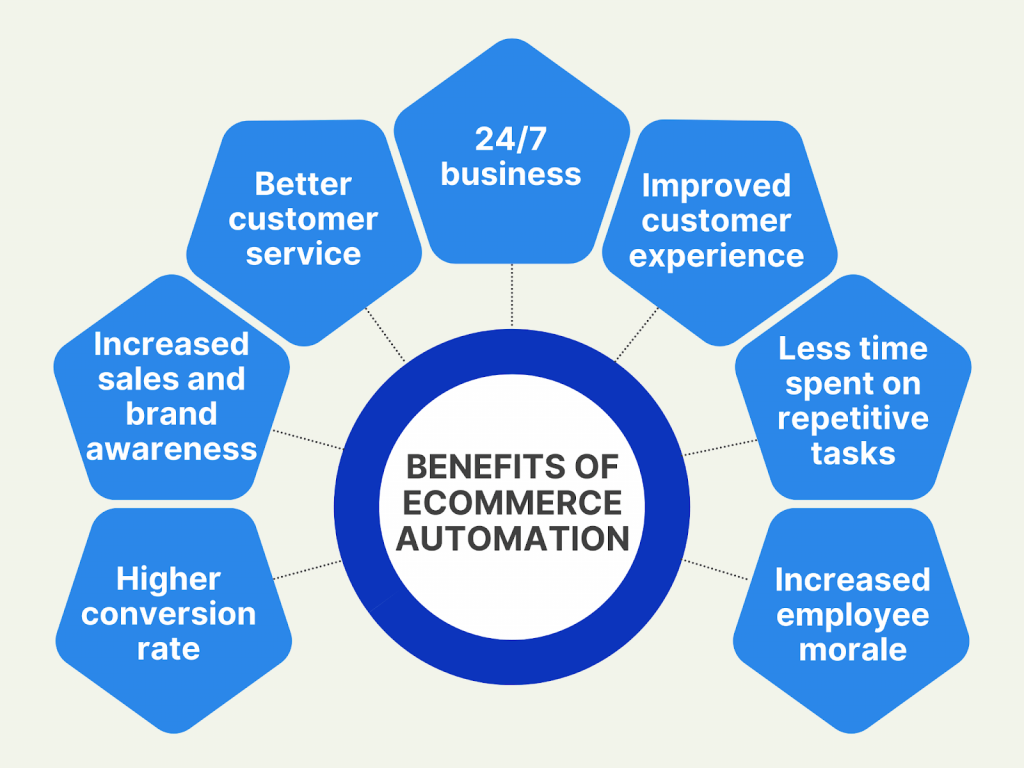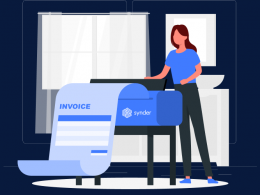It’s a well-known fact that your routine can be automated with the help of various platforms, tools and software. The only challenge is to find the best solution for your business. So let us help you make your choice by providing useful information on the most necessary tools one needs to apply in their business.
If you’re already running your own store or online business, or if you’re just starting out, it’s time to apply automated ways to make your business grow, bring you more profit and happy customers.
Contents:
1. Introduction to ecommerce automation
2. Top ecommerce automation solutions
3. Sales automation for ecommerce
Introduction to ecommerce automation
Ecommerce automation refers to the use of technology and software tools to streamline and simplify various processes and tasks involved in running an online store or ecommerce business. The primary goal of ecommerce automation is to improve efficiency, reduce manual labor, enhance customer experiences, and ultimately increase profitability.
In short, automation gives you the opportunity to automate your business activities by incorporating tools that are simple, user-friendly and efficient.
Here are some key benefits of automating your business:
- Higher conversion rate
- Increased sales and brand awareness
- Better customer service
- 24/7 business
- Improved customer experience
- Less time spent on repetitive tasks
- Increased employee morale

Top ecommerce automation solutions
Accounting & finance management software for ecommerce automation
Ecommerce automation integrates accounting and finance software to automate tasks like tracking revenue, expenses, and taxes. This ensures accurate financial records, simplifies tax compliance, and supports data synchronization with ecommerce platforms, reducing manual effort and ensuring financial stability.
A common myth about starting up a business is that you need to be an accountant. Together with a good bookkeeper, accounting software gives you more flexibility and time savings. It makes your processes more affordable and offers a pool of tools needed to streamline your accounting and finances, as well. So, now accounting software can automate a lot of the work that you might normally do manually, such as account reconciliation, expense tracking, managing invoices and payments, and more. Here are a few hot examples.
Synder

Synder is the best accounting software for SMBs. It does everything automatically and gives its users a unique chance to have all the necessary sales data in one source of truth.
After you connect your payment platforms and sales channels, you get automated bookkeeping: accurate and hassle-free synchronization of your payment data per transaction or in bulk, which will greatly aid in smooth reconciliation of accounts. Your data will be recorded seamlessly without any duplicates. You’ll receive comprehensive and 100% error-free Profit and Loss reports, which will help you with future budget planning and make your business prosper.
Thanks to Synder’s reporting feature, you can get various other reports on LTV, AOV, gross sales, platform fees, customer behavior, top and least performing products, and a lot more, and use them to adjust your business strategies.
Among other features, you’ll find invoicing, which allows you to send one-time or recurring invoices to remind customers about regular payments. Synder also gives you a chance to apply taxes based on location, sales taxes, product name, shipping address, etc. You can expect correct conversion rate calculations for your multi-currency payments. Plus, Synder’s support service is remarkable and highly rated by their clients.
Read more about Synder’s tax and multi-currency features.
Try out Synder firsthand – create a free account or visit the Weekly Public Demo, where you’ll get a tour around these and a host of other Synder’s state-of-the-art features.
Adaptive Planning

Adaptive Planning acquired by Workday, Inc. in August 2018, offers advanced financial planning solutions and enterprise software designed to modernize financial modeling and forecasting, and budgeting processes. Their solutions encompass financial, workforce, and sales planning, fostering collaboration throughout the organization, eliminating error-prone spreadsheets, and replacing rigid legacy systems. Adaptive Planning’s finance software serves as a comprehensive enterprise performance management solution.
Primarily targeted at large companies, and divisions of large enterprises, Adaptive Planning is particularly beneficial for addressing challenges such as manual financial processes, data accessibility issues, data inaccuracies, limited scalability, subpar data visualization, inefficient collaboration, disjointed spreadsheet use, and inadequate professional development for Financial Planning and Analysis (FP&A) teams.
What is ecommerce accounting software?
Ecommerce accounting software is an application designed to help online businesses manage and streamline their financial operations, including tracking sales, expenses, profits, taxes, and inventory. It’s tailored to the unique needs of ecommerce businesses, which often deal with high volumes of transactions, multiple payment gateways, and sales channels across different platforms (Amazon, eBay, Shopify, etc.).
Sales automation for ecommerce
As a small business owner, you know you’re the customer’s first interaction with your brand. You only have seconds to grab their attention, and convince them to give your product a try. So, there’s a need to find an ideal solution that can assist you with customer interaction. That is where online sales automation solutions come into play. Automation software can make the selling process faster and more efficient for your small business. As a small business owner you will not have to constantly work with customer relationships. With the help of automation software you will be able to take up other tasks that will enable you to focus on your work.
SALESmanago marketing automation

SALESmanago is a marketing automation platform that enables you to reach out to and speak to new prospects and customers. The solution is best suited for sales, marketing, sales and service professionals who sell, market and provide services to customers online or offline. It’s designed to improve your conversion rate, increase average order value and improve customer satisfaction.
SalesManago provides a complete solution to engage with your potential customers on different social channels like Facebook, X (formerly Twitter), Instagram, Google+, Pinterest and LinkedIn.
Freshsales

Freshsales improves sales by allowing your customer-centric team to respond to emails, texts, phone calls and other communication with customers. You can create a mix of automated communication for your customer, which makes the user-customer relationship more engaging and emotional.
Freshsales’ CRM tool will automate your customer’s lifecycle from initial contacts, billing, remarketing, collections to close.
Email marketing automation for ecommerce
Tired of maintaining your email list and the prospect of attracting the people who aren’t yet ready to buy? Just Wait! What if you can automate the email marketing process? What if you can generate leads and nurture them with an automated email message based on their email preferences? That will surely save your time.
Encharge

Encharge is an excellent email automation software for SaaS that works very well for SMB and even large companies. It can create personalized and customizable email campaigns as per your customers’ needs.
It can perform predictive remarketing, create lead scoring, send email and SMS auto responders, and automate tasks that are important for day to day operations. It can also save time in following up, and take action on customer interactions with marketing automation features such as, CRM, Salesforce, HubSpot, Marketo, SAP, and Microsoft.
Benchmark Email

By adding Benchmark Email automation to your email marketing campaigns, you’ll increase your lead conversion rate and boost your click-through rates. This email marketing software is easy to integrate into your existing or new marketing campaign which can be personalized to suit your individual needs.
The software enables you to automate simple tasks such as sending your customers’ emails to your marketing list, identifying the potential prospects’ activity based on engagement or loyalty, and sending them personalized messages to their inbox.
Details of other types of ecommerce automation
- Inventory management: Automation can help track inventory levels in real-time, trigger reorders when stock is low, and update product availability on your website automatically, which makes sure that you don’t oversell products or run out of stock.
- Order processing: Ecommerce automation can automate order fulfillment processes, including order confirmation emails, invoice generation, shipping label creation, and even inventory deduction. This type of automation helps speed up order processing and reduce errors.
- Customer relationship management (CRM): Automated CRM tools can help manage customer data, track customer interactions, and send personalized email marketing campaigns and follow-ups to boost customer engagement and retention.
- Marketing automation: Automation tools can assist in executing marketing campaigns, such as sending abandoned cart reminders, recommending products based on customer behavior, and scheduling social media posts.
- Customer support: Chatbots and automated customer support systems can handle common customer inquiries and provide instant responses, improving the overall customer service experience.
- Analytics and reporting: Automation can generate reports and provide insights into ecommerce performance, such as sales trends, website traffic, and customer behavior, helping businesses make data-driven decisions.
- Price optimization: Automated pricing algorithms can adjust product prices dynamically based on market conditions, competition, and other factors to maximize profits.
- Shipping and logistics: Ecommerce automation can integrate with shipping carriers to streamline the shipping process, generate labels, and provide tracking information to customers.
- Payment processing: Automation can handle payment processing securely, including authorization, fraud detection, and recurring billing for subscription-based businesses.
- Personalization: Automated systems can analyze customer data and behavior to deliver personalized product recommendations, content, and shopping experiences.
- Returns and refunds: Automation can simplify the returns and refunds process, making it more efficient for both customers and businesses.
- Website management: Content management systems (CMS) with automation capabilities can help update product listings, images, and other content automatically.
Final thoughts on ecommerce automation
Automation is a trending field for many companies nowadays. It saves both time and effort and makes it easier for everyone. Automation is one of the key steps of a business. It provides customers with personal attention and gives the freedom to do whatever it takes to meet a certain milestone.
As seen from above, these services come in three categories. These automation tools can help in improving your business and reduce the time taken to serve customers.






